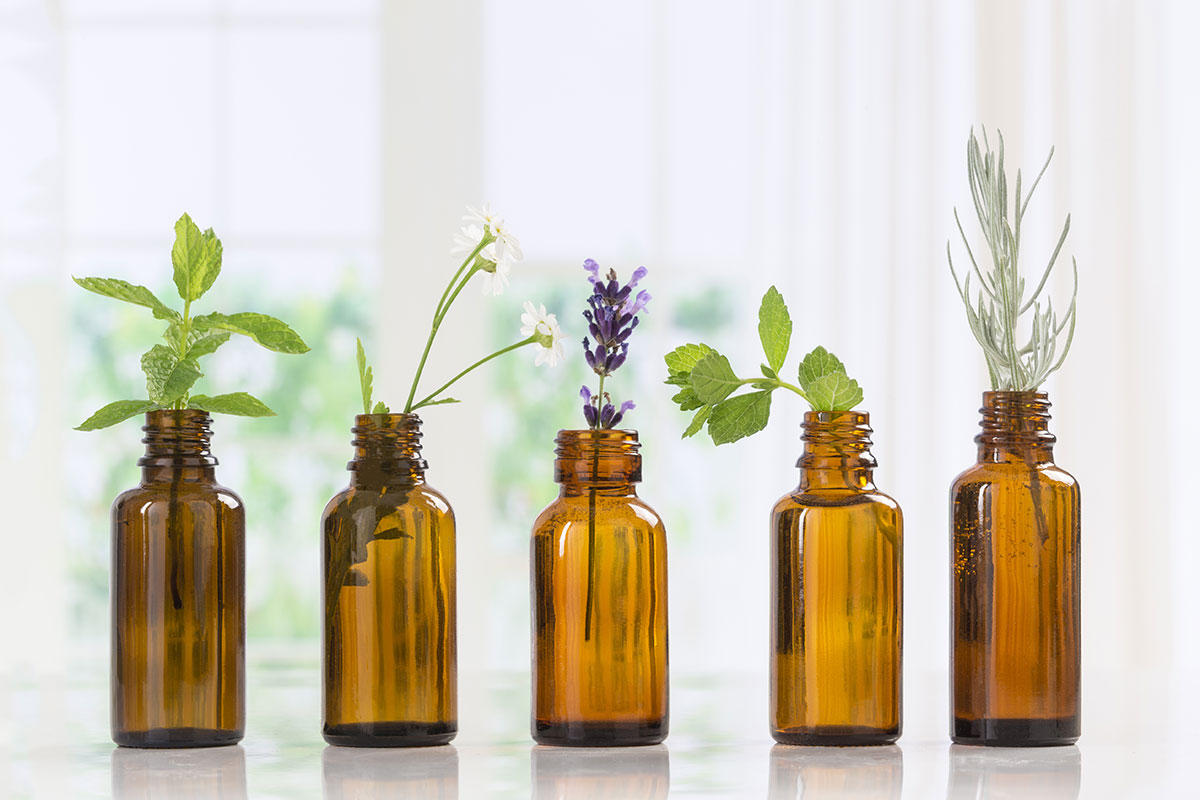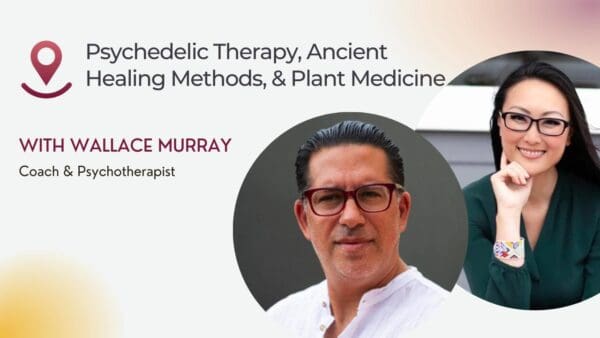Medical Editor: Dr. Benjamin Malcolm, PharmD, MPH, BCPP
Most essential oils are plant extracts created by steam distillation. Newer methods such as CO2 extraction are also being used. When inhaled, essential oils stimulate the olfactory nerves and the olfactory cortex, the part of our brain which perceives smell.
Information we take in through our sense of smell directly affects the amygdala, which is an important emotional center of the brain. A 2003 study using lavender and rosemary essential oils suggests that essential oils can produce objective effects on cognitive performance in addition to subjective effects on mood. During a psychedelic experience, the olfactory bulb inputs to the amygdala and hippocampus can mediate “smell-triggered emotional memories,” as described in a blog post by Dr. Benjamin Malcolm. This can create mystical memories as a product of personal development and “psychedelic aromas.”
Keep reading to learn how essential oils can be powerful allies during a trip, how they work as plant medicine on their own, and to learn more information on 9 common essential oils and their uses.
Using Essential Oils During A Trip
Many practitioners refer to essential oils as herbal allies, as they can be used to steer a trip in the right direction. “If I’m tripping at home I always have my diffuser and either peppermint or lavender oils going,” writes one Reddit user on a thread about aromatherapy on acid (LSD).
Most essential oils should not be applied directly to the skin without prior dilution as they can cause irritation. Diluting the pure essential oil with a carrier oil prior to topical application, putting a few drops into an essential oil diffuser, or creating a room spray are generally safe methods of using essential oils.
Some ketamine practitioners are enhancing the experience through the use of essential oils. “I have combined ketamine with essential oils, which in my experience can significantly enhance the healing process that ketamine offers,” writes Florian Birkmayer, MD.
Because one’s sense of smell is tied closely to memory, adding essential oil to a psychedelic experience can create an anchor of sorts, which is helpful in integration work. Inhaling a scent used during a psychedelic experience can be a beneficial tool in integration work, by helping one tap into mystical experiences.
Essential Oils As Plant Medicine
Aromatic extracts from plants such as essential oils have long histories of medicinal value in traditional or folkloric medicine as well as several known applications in allopathic medicine. Formalized research into their medicinal value is increasing.
For example, a 2015 review found several essential oils have the potential for medical value in dentistry. Lavender oil has increasingly robust evidence supporting it’s safety and efficacy for generalized anxiety. Eucalyptol (from eucalyptus oil) is helpful for a variety of respiratory conditions, and peppermint oil has known value for treating irritable bowel syndrome. There are myriad more examples of how different essential oils have real medicinal value with both psychological and physiologic effects.
There are several methods of intake for essential oils. They can be inhaled, such as placing lavender essential oil diluted in a carrier oil under the nose to promote relaxation. While some essential oils can also be ingested, consuming essential oils can be dangerous and even deadly when not done correctly. Eucalyptus oils can cause seizures when swallowed in large quantities. A 2020 study on clinical aromatherapy writes that “Essential oils can be dangerous and toxic, with some being flammable, causing skin dermatitis, being phototoxic with risk of a chemical burn, or causing oral toxicity or death.”
Essential Oils Precautions and Ethical Considerations
While most essential oils are safe if used appropriately, some do have potentially harmful interactions with certain medications. For instance, essential oils such as cinnamon, clove, balsam fir, oregano, or wintergreen could produce unwanted side effects in people taking blood thinner medications.
Certain scents may not be pleasant to all persons or could even trigger migraine headaches, underscoring the need to research ahead of time and have the consent of participants if aromatherapy is being combined with psychedelic therapies.
Current perspectives on psychedelic therapies often encourage non-directive or supportive roles for persons facilitating sessions. On the other hand, scented products are often heavily featured during traditional psychedelic rituals (e.g. ayahuasca). Scent may be an effective tool in shifting mood states or thoughts during psychedelic experiences, although may need judicious employment and timing to avoid unnecessary distraction from the contents of the participant’s experience.
Those new to essential oils can enjoy them through inhalation. It’s advised to consult a knowledgeable herbalist, and your doctor before applying any to the skin or consuming them.
Another ethical consideration focuses on the sustainability of essential oils. Essential oils require a staggering amount of plant material, just to produce a tiny bottle of oil. “We should be mindful and refrain from utilizing essential oils in an excessive, careless, or wasteful manner. We often emphasize the important less is more approach when it comes to essential oil safety and efficacy. However, the less is more approach can and should also be applied to the conscientious use of essential oils due to the significant amount of botanical material required to produce essential oils. Sustainability is a very real concern, especially given the growing demand for essential oils,” writes aromatherapy educator Andrea Butje. This is of particular concern for oils such as frankincense, palo santo, and Hawaiian sandalwood. Other oils, such as lavender or orange that are produced on mass farms are more widely available and therefore less of a concern from a sustainability perspective.
There are books available one can use to become well-versed in this subject, such as Essential Oil Safety by Robert Tisserand. However, because research is somewhat limited on the subject, one should discuss their medical history and current prescriptions with their doctor prior to using essential oils.
Common Essential Oils
Each essential oil is a unique composition of aromatic chemicals, carrying bioenergetic signatures that are as specific and special to each (batch) of essential oil. It may be helpful to think about essential oils in different categories that have overlapping or complementary chemistry. Below is a discussion of how these may relate to psychedelic therapy.
Calming, Relaxing, or Grounding oils
One of the primary uses and benefits to aromatherapy relates to the reduction of stress levels, although some essential oils are more famous than others when it comes to providing relaxing or calming effects. Essential oils of lavender, bergamot, and vetiver are well known for these uses.
Lavender: Lavender, an ever-popular essential oil, is best known for its relaxing properties. It’s used for insomnia, anxiety, and depression. While lavender essential oil works as a natural sedative regardless of if one is tripping, during a psychedelic experience, it could promote calm and relaxation.
Bergamot: Research shows that bergamot can help lower cortisol, a stress hormone that is released under stressful conditions.. A 2017 study, in which mental health patients inhaled bergamot oil, showed that it can reduce stress and increase positive feelings. Bergamot oil might help some people reduce anxiety during a psychedelic experience.
Vetiver: Vetiver is a grounding oil (literally, it’s used to control soil erosion). A 2016 animal study found that inhaling vetiver oil improved alertness and brain function. Another 2015 animal study found that vetiver can reduce anxiety.
Uplifting, clearing, or stimulating oils
Many essential oils are stimulating, uplifting, or can be used to help bring the focus back to the present. These include oils such as eucalyptus, peppermint, and rosemary as well as citrus or pine oils.
Eucalyptus: Eucalyptus oil has pain-relieving properties and is commonly used as a topical on sore muscles and joints for its anti-inflammatory benefits. Studies tout its antiviral, antifungal, and antibacterial properties.
Lemongrass: Lemongrass is traditionally used to treat high blood pressure and aid in digestive issues. It has antioxidant and anti-inflammatory properties. It’s also calming and can aid in relaxation, but due to the citrus aroma, is more uplifting than lavender.
Peppermint: As noted above, anecdotal reports show that peppermint oil can help one stay calm during a trip. As noted by a 2019 study on migraines, peppermint essential oil can fight headaches and is perhaps most notably a digestive aid. Psychedelics such as ketamine can come with digestive side effects; peppermint is a great essential oil to keep on hand to combat nausea. It’s worth noting that fighting off nausea and vomiting is a fairly Western concept. Psychedelics, such as ayahuasca, used by indigenous cultures in South America also cause nausea and vomiting. However, this is a welcome purge considered to be a crucial part of the experience. While peppermint can calm the stomach, consult with your therapists or guide regarding whether purging is a welcome part of psychedelic therapy.
Spiritual, divine, or sacred oils
Essential oils have rich histories of use in conjunction with spiritual or religious rituals as well as tools for increasing emotional openness or as aphrodisiacs. For example, frankincense literally means divine incense and is still widely used in holy temples or churches today. Oils such as rose are heavily featured in many perfumes and have even been shown to increase libido in persons with sexual dysfunction from SSRI use. Palo santo, white sage, myrrh, or Hawaiian sandalwood are other highly prized spiritual oils. Of note, these oils often carry the highest concerns around sustainability.
Rose: Rose essential oil contains many of the same healing tools other essential oils do, such as antibacterial and antifungal properties. Spiritually speaking, it is associated with the heart chakra and its ability to help one receive love. There is evidence that rose oil can increase sexual desire in patients whose libido is affected by SSRIs or methadone. Keep rose oil with you during a trip if you want to encourage self-love.
Palo Santo: Palo Santo translates to “holy wood” in Spanish and is used for spiritual cleansing. It’s believed to clear away negative energy, and its earthy, grounding scent can offer a purifying experience during psychedelic therapy. If you’re outside, Palo Santo can even ward off mosquitoes.
Frankincense: Frankincense, which literally means “divine incense,” has been shown to improve asthma. Use it to encourage breathing patterns and increase spiritual awareness.
Final Thoughts and Conclusions
Essential oils are powerful plant allies, whether used alone or in conjunction with psychedelic medicine. One should always use essential oils as directed, as consuming the wrong quantity or using the wrong method of intake could potentially cause serious harm. It’s also important to consider sustainability when working with essential oils. While more research is needed on the medical uses of essential oils, historical and anecdotal evidence suggests that when used safely, they can enhance a psychedelic experience. This happens through grounding work, breathing patterns, and using scent as an anchor to aid in integration work.
This is far from a complete list of essential oils. Check out the suggested reading list below to learn more.
The Beginner’s Guide to Essential Oils: Everything You Need to Know to Get Started








